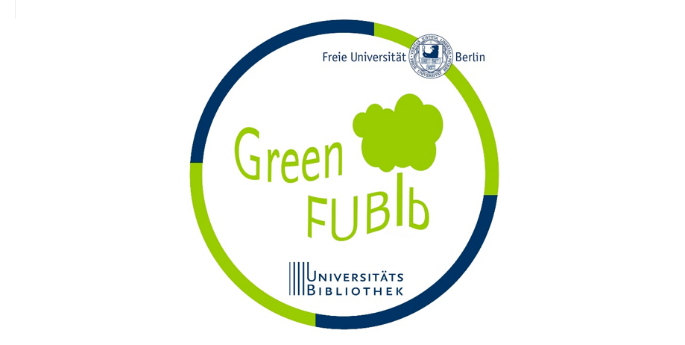Green FUBib: Sustainability at the University Library
Janet Wagner
Philological Library, University Library, Freie Universität Berlin, Germany
E-mail: [email protected]

The GreenFUBib group is committed to sustainable action in everyday library life at Freie Universität. What have we already changed, and what do we still plan to do?
“The idea of sustainability is neither a brainchild of modern technocrats nor a brainwave of eco-freaks of the Woodstock generation. It is our most original world cultural heritage.”
(Grober, Ulrich: Die Entdeckung der Nachhaltigkeit – Kulturgeschichte eines Begriffs, Kunstmann, 2010, p. 13)
Everywhere on this planet – no longer somewhere far away, but also on our own doorstep – severe changes are taking place in nature and the climate. The environmental guidelines of Freie Universität Berlin, have included responsible action and personal responsibility of all people in research, teaching, studies and at the workplace both as a commitment and an appeal for many years. The university library with its 13 locations, has also specified in its strategy document that sustainability and responsibility should guide cooperation as one of seven values.
A workshop on “Sustainability in the Library System” in summer 2020 kicked off various working groups that dealt with sustainable digitisation, usage services, mobility, and procurement. At the beginning of 2021, the permanent working group GreenFUBib was founded.
GreenFUBib wants to contribute to filling the strategic terms of sustainability and responsibility with life in everyday library activities. In line with the 17 global sustainability goals, it not only keeps the ecological, but also the economic, social and cultural dimensions in mind. Against the background of the climate emergency declared by Freie Universität in 2019, it is aware that only joint efforts can lead to the desired goal of climate neutrality in the university sector by 2025.
The GreenFUBib working group is concerned with the following questions: What can be done for sustainability and climate protection in the everyday work at the library? Which measures are low-threshold and effective? Which ideas can be implemented for all, or at least most, library locations? Among other things, the following changes have taken place in recent years:
- Introduction of reusable library baskets instead of plastic bags
- Exclusive use of 100% recycled paper
- No receipt slips for borrowing and returning books
- Book transport between library locations by e-transporter
- Climate-neutral delivery by local bookshops by bicycle, public transport or e-car
- Setup of an electricity-generating bicycle ergometer for more exercise in the learning environment at the Philological Library
- Establishment and maintenance of a library garden in the Library of Social Sciences and Eastern European Studies, including a thermal composter for organic waste
- Re-use of furniture in the Geosciences Library
- Binding agreements on plastic-free book deliveries with a number of domestic and foreign bookshops
- Annual participation in climate-neutral commuting as part of the city cycling campaign
- Regular expert discussions with trainees on the topic of “Green Library”
The following projects are being planned:
- Sponsorship of a flower meadow in front of the University Library
- Examination of a drinking-water dispenser concept at the individual library locations
- Planning a campus tour about sustainability via app
- Scanning instead of copying: Scan tents as an environmentally friendly alternative to copying and printing.
For optimal inter-department and inter-house communication and networking, the GreenFUBib working group works closely with the following partners:
- Unit for Sustainability and Energy Management
- Freie Universität Berlin Environmental Policy Research Centre
- University Library Communication Team
The regular documentation and dissemination of sustainability activities and topic-related training via newsletters, wikis, biblioblogs, websites as well as events for library staff are important to us. Starting this year, a library colleague has been working part-time in the area of sustainability and its communication.